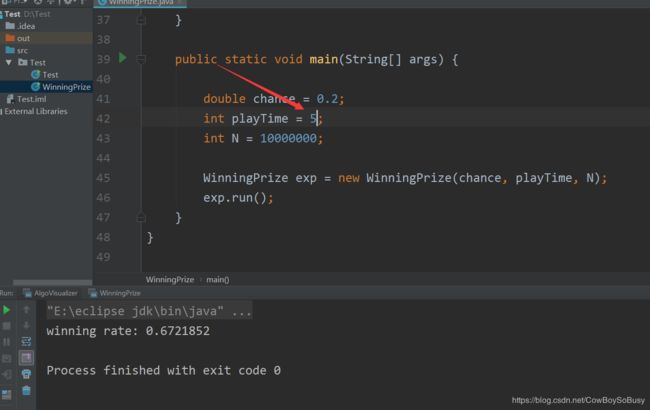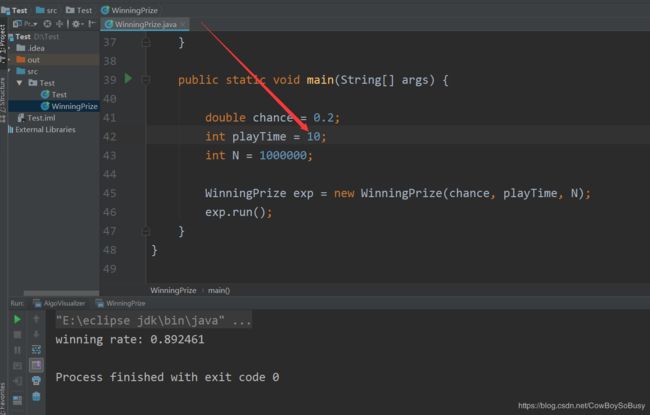- 008 【入门】算法和数据结构简介
要天天开心啊
算法专栏算法数据结构
算法与数据结构系统概览|[算法]-[基础]-[通用]一、算法分类与应用1.硬计算类算法|[算法]-[中级]-[通用]特点应用场景复杂度特征-精确求解问题-可能带来较高计算复杂度-大厂笔试/面试-ACM竞赛-所有程序员岗位必考⏱️通常为O(n)~O(n²)//[示例]快速排序算法-分治思想核心实现publicvoidquickSort(int[]arr,intleft,intright){if(le
- 莫队算法 —— 将暴力玩出花
秒啦
算法
莫队算法——将暴力玩出花一、为什么需要莫队?——暴力法的瓶颈我们已经学会了用分块处理一些在线的区间问题。现在,我们来看一类特殊的离线区间查询问题。“离线”意味着我们可以把所有查询先读进来,再按我们喜欢的顺序去处理它们。思考一个问题:给定一个长度为N的数组,M次询问。每次询问一个区间[l,r],问区间内有多少种数字至少出现了2次?那我们回到最朴素的暴力。纯暴力:对于每个询问(l,r),都for一遍,
- Web3前沿科技:开启数字资产交易新征程
AI天才研究院
AI大模型企业级应用开发实战AgenticAI实战AI人工智能与大数据web3科技ai
Web3前沿科技:开启数字资产交易新征程关键词:Web3、数字资产交易、区块链、智能合约、去中心化金融摘要:本文聚焦于Web3前沿科技在数字资产交易领域的应用与发展。详细阐述了Web3的核心概念、相关技术原理,包括区块链、智能合约等。通过具体的算法原理和Python代码示例,深入剖析了数字资产交易在Web3环境下的运行机制。同时,结合实际项目案例,讲解了开发环境搭建、代码实现与解读。探讨了Web3
- 高斯混合模型GMM&K均值(十三-1)——K均值是高斯混合模型的特例
phoenix@Capricornus
模式识别与机器学习均值算法机器学习算法
EM算法与K均值算法的关系K均值可以看成是高斯混合模型的特例。对K均值算法与EM算法进行比较后,可以发现它们之间有很大的相似性。K均值算法将数据点硬(hard)分配到聚类中,每个数据点唯一地与一个聚类相关联,而EM算法基于后验概率进行软(soft)分配。事实上,可以从EM算法推导出K均值算法。考虑一个高斯混合模型,其中混合分量的协方差矩阵由σ2I{\sigma^2}Iσ2I给出,其中σ2{\sig
- Practical TLA+ 项目中的Dekker算法形式化验证
焦习娜Samantha
PracticalTLA+项目中的Dekker算法形式化验证practical-tla-plusSourceCodefor'PracticalTLA+'byHillelWayne项目地址:https://gitcode.com/gh_mirrors/pr/practical-tla-plus概述本文分析PracticalTLA+项目中关于Dekker互斥算法的形式化规范。Dekker算法是解决多线
- 【C++算法竞赛】前缀和+桶数组
YLCHUP
C++算法技巧算法c++开发语言数据结构哈希算法c语言笔记
文章目录1.前缀和基础2.算法原理3.例题讲解[P1114“非常男女”计划](https://www.luogu.com.cn/problem/P1114)[P11965[GESP202503七级]等价消除](https://www.luogu.com.cn/problem/P11965)[P10724[GESP202406七级]区间乘积](https://www.luogu.com.cn/pro
- 【机器学习与数据挖掘实战 | 医疗】案例18:基于Apriori算法的中医证型关联规则分析
Francek Chen
机器学习与数据挖掘实战机器学习数据挖掘Aprioripython关联规则人工智能
【作者主页】FrancekChen【专栏介绍】⌈⌈⌈机器学习与数据挖掘实战⌋⌋⌋机器学习是人工智能的一个分支,专注于让计算机系统通过数据学习和改进。它利用统计和计算方法,使模型能够从数据中自动提取特征并做出预测或决策。数据挖掘则是从大型数据集中发现模式、关联和异常的过程,旨在提取有价值的信息和知识。机器学习为数据挖掘提供了强大的分析工具,而数据挖掘则是机器学习应用的重要领域,两者相辅相成,共同推动
- 提示词编程语言设计艺术探索
AI天才研究院
计算AI人工智能与大数据AI大模型企业级应用开发实战javapythonjavascriptkotlingolang架构人工智能大厂程序员硅基计算碳基计算认知计算生物计算深度学习神经网络大数据AIGCAGILLM系统架构设计软件哲学Agent程序员实现财富自由
《提示词编程语言设计艺术探索》关键词:提示词编程语言,设计艺术,编程语言设计,核心算法,实例分析,项目实战摘要:本文旨在深入探讨提示词编程语言的设计艺术,从基础概念到核心算法,再到实际应用和未来趋势,全面解析这一领域的关键技术和设计理念。通过具体的实例分析和项目实战,帮助读者更好地理解和掌握提示词编程语言的设计与实现。引言与概述1.1提示词编程语言的背景和重要性提示词编程语言(Prompt-Bas
- 误差的回响:反向传播算法与神经网络的惊天逆转
田园Coder
人工智能科普人工智能科普
当专家系统在20世纪80年代初期大放异彩,成为人工智能实用化的耀眼明星时,另一股曾经被宣判“死刑”的力量——连接主义(神经网络)——正在寒冬的冻土下悄然涌动,孕育着一场惊天动地的复苏。马文·明斯基和西摩·帕尔特在1969年《感知机》专著中那精准而冷酷的理论批判,如同沉重的封印,将多层神经网络的研究禁锢了近二十年。他们指出的核心死结——缺乏有效算法来训练具有隐藏层的网络——仿佛一道无法逾越的天堑。单
- C++ Lambda表达式详解:从入门到精通
Jay_515
c++Lambda
Lambda表达式是C11引入的最重要特性之一,它彻底改变了我们在C中编写函数对象的方式。本文将带你全面掌握Lambda表达式的使用技巧!1.什么是Lambda表达式?Lambda表达式是C++11引入的一种匿名函数对象,它允许我们在需要函数的地方内联定义函数,无需单独命名。Lambda的出现极大简化了代码,特别是在使用STL算法时。为什么需要Lambda?简化代码:避免为简单操作单独编写函数对象
- Tiktok App 登录账号、密码、验证码 XOR 加密算法
抖音App登录账号、密码、验证码XOR加密算法%E9n+z,\&R1a4b.^流程分析登录TiktokAPP时,通过抓包发现账号密码是非明文传输的。getUserProfile($userId,$secUid);echo"\n\n视频列表:\n";echo$tiktok->getMixList($userId);//示例:加密后的密码hex字符串$encrypted_hex="7472607771
- mongodb和redis的区别:
huangbfeng
mongodbredis数据库
1、内存管理机制Redis数据全部存在内存,定期写入磁盘,当内存不够时,可以选择指定的LRU算法删除数据。MongoDB数据存在内存,由linux系统mmap实现,当内存不够时,只将热点数据放入内存,其他数据存在磁盘。2、支持的数据结构Redis支持的数据结构丰富,包括hash、set、list等。MongoDB数据结构比较单一,但是支持丰富的数据表达,索引,最类似关系型数据库,支持的查询语言非常
- 数据库系统工程师简要概括笔记
Mint_Datazzh
数据库系统工程师数据库笔记数据库系统工程师
文章内容仅为粗略总结知识,便于个人复习思考原文链接:数据库系统工程师简要概括笔记–笔墨云烟数据库系统工程师—1.1计算机硬件基础知识数据库系统工程师—1.2计算机体系结构与存储系统数据库系统工程师—1.3安全性、可靠性与系统性能评测基础知识数据库系统工程师—2.程序语言基础知识数据库系统工程师—3.1~3.4线性结构、数组和矩阵、树和二叉树、图数据库系统工程师—3.5排序算法数据库系统工程师—3.
- 结构化数据增强的生成式算法案例:客户交易数据增强
python游乐园
数据深度学习大数据算法学习
1基础信息1.1案例背景这是一个用于增强结构化客户交易数据的生成式算法。这种类型的数据增强在金融、电子商务等领域非常有用,可以帮助解决数据不平衡问题或在小数据集上提高模型性能。1.2问题定义给定原始交易数据集D={x₁,x₂,...,xₙ},其中每条记录包含:交易金额交易时间客户年龄客户收入水平交易类别地理位置是否为欺诈交易(标签)目标:生成与原始数据分布相似但多样化的新样本,同时保持字段间的合理
- LLMs基础学习(八)强化学习专题(7)
汤姆和佩琦
NLP学习Actor-Critic算法
LLMs基础学习(八)强化学习专题(7)文章目录LLMs基础学习(八)强化学习专题(7)Actor-Critic算法基础原理算法流程细节算法优缺点分析算法核心总结视频链接:https://www.bilibili.com/video/BV1MQo4YGEmq/?spm_id_from=333.1387.upload.video_card.click&vd_source=57e4865932ea6c
- 【基数排序介绍】
wdwc2
算法设计算法数据结构排序算法
文章目录前言一、基数排序是什么?二、基数排序的步骤(LSD低位优先)1.找出最大数的位数2.对每一位进行排序(从最低位到最高位)三、C++实现1.主函数:基数排序实现四、时间复杂度分析五、基数排序的适用场景六、与其他排序算法对比七、扩展:处理负数的思路总结前言在处理大规模整数排序问题时,比较类排序(如快速排序)可能无法发挥最优性能。本篇博客将详细介绍一种非比较类排序算法:基数排序(RadixSor
- 前端开发者必看:Node.js实战技巧大揭秘
大厂前端小白菜
前端开发实战node.jsvim编辑器ai
前端开发者必看:Node.js实战技巧大揭秘关键词:前端开发者、Node.js、实战技巧、模块化开发、性能优化、Express框架、Webpack摘要:本文专为前端开发者打造,旨在深入揭秘Node.js的实战技巧。首先介绍了Node.js的背景和对前端开发的重要性,接着详细阐述了Node.js的核心概念与联系、核心算法原理及具体操作步骤,通过数学模型和公式进一步加深理解。然后结合实际案例,从开发环
- 10个基于Python的计算机视觉实战项目
云博士的AI课堂
基于Python计算机视觉python计算机视觉机器视觉人工智能
10个基于Python的计算机视觉实战项目,涵盖多个领域和应用场景,每个项目均附有GitHub地址、概述、解决的问题及应用场景:1.PCV图像处理与计算机视觉库GitHub地址:jesolem/PCV概述:提供计算机视觉基础算法的Python实现,包括图像分割、直方图均衡化、图像增强等。解决的问题:简化图像处理流程,支持快速实现算法原型。应用场景:学术研究、教学实验、图像预处理任务。2.基于朴素贝
- 实现并查集数据结构的技术指南
一键难忘
数据结构算法并查集
本文收录于专栏:算法之翼https://blog.csdn.net/weixin_52908342/category_10943144.html订阅后本专栏全部文章可见。实现并查集数据结构的技术指南并查集(DisjointSetUnion,简称并查集)是一种常用的数据结构,用于管理元素之间的等价关系。它主要支持两种操作:合并(Union)和查找(Find)。并查集通常用于解决各种问题,如图论中的连
- MATLAB实现WOA-BP鲸鱼优化算法优化BP神经网络多输入单输出回归预测(含模型描述及示例代码)
nantangyuxi
MATLAB含模型描述及示例代码算法matlab神经网络大数据人工智能深度学习机器学习
目录MATLAB实现WOA-BP鲸鱼优化算法优化BP神经网络多输入单输出回归预测(多指标,多图)1项目背景介绍...1项目目标与意义...2项目挑战...3项目特点与创新...5<
- 华为OD机试 2025 B卷 - 抢7游戏 (C++ & Python & JAVA & JS & GO)
无限码力
华为OD机试真题刷题笔记华为od华为OD机试华为OD机试2025B卷华为OD2025B卷华为OD机考2025B卷
抢7游戏华为OD机试真题目录点击查看:华为OD机试2025B卷真题题库目录|机考题库+算法考点详解华为OD机试2025B卷100分题型题目描述A、B两个人玩抢7游戏,游戏规则为:A先报一个起始数字X(10≤起始数字≤10000),B报下一个数字Y(X-Y<3),A再报一个数字Z(Y-Z<3),以此类推,直到其中一个抢到7,抢到7即为胜者;在B赢得比赛的情况下,一共有多少种组合?输入描述起始数字M。
- C#推箱子游戏源代码解析与实践指南
Boa波雅
本文还有配套的精品资源,点击获取简介:C#推箱子游戏是一个经典的益智游戏,适合编程初学者学习C#语言和游戏开发的基础知识。本篇文章将深入探讨使用C#语言开发推箱子游戏的源代码,涉及面向对象编程、图形用户界面(GUI)、事件驱动编程、数据结构与算法、状态管理、错误检查与边界条件、游戏逻辑以及调试技巧。通过学习本课程,初学者将能够掌握C#编程的基础和游戏逻辑的实现,并能够创建用户友好的界面。1.面向对
- 量子机器学习前沿:量子神经网络与混合量子-经典算法
软考和人工智能学堂
人工智能#深度学习Python开发经验量子计算
1.量子计算基础1.1量子比特与量子门importnumpyasnpfromqiskitimportQuantumCircuit,Aer,executefromqiskit.visualizationimportplot_histogram#单量子比特操作演示defsingle_qubit_demo():qc=QuantumCircuit(1)qc.h(0)#Hadamard门创建叠加态qc.rz
- Pytorch模型安卓部署
python&java
pytorch人工智能python
Pytorch是一种流行的深度学习框架,用于算法开发,而Android是一种广泛应用的操作系统,多应用于移动设备当中。目前多数的研究都是在于算法上,个人觉得把算法落地是一件很有意思的事情,因此本人准备分享一些模型落地的文章(后续可能分享微信小程序部署,PyQt部署以及exe打包,ncnn部署,tensorRT部署,MNN部署)。本篇文章主要分享Pytorch的Android端部署。看这篇文章的读者
- 【华为od刷题(C++)】HJ11 数字颠倒
m0_64866459
算法c++开发语言
我的代码:#include#include#include//引入算法库,提供常见的算法,比如排序、查找、反转等,这里使用了reverse函数来反转字符串usingnamespacestd;intmain(){strings;getline(cin,s);reverse(s.begin(),s.end());/*reverse函数反转字符串的字符顺序s.begin()和s.end()分别表示字符串
- 策略模式与工厂模式的黄金组合:从设计到实战
策略模式和工厂模式是软件开发中最常用的两种设计模式,当它们结合使用时,能产生1+1>2的效果。本文将通过实际案例,阐述这两种模式的协同应用,让代码架构更优雅、可维护性更强。一、为什么需要组合使用?单独使用的痛点策略模式:客户端需要知道所有策略类,并手动创建策略实例工厂模式:单独使用时主要解决对象创建问题,不涉及算法切换组合后的优势彻底解耦:客户端无需知道策略类的存在和创建方式一键切换:通过工厂统一
- 算法题刷多少道就可以应付面试手撕了
cpp辅导的阿甘
c++
前言周五晚上答疑,有同学问算法题刷到什么地步就行了。接下来针对刷算法题,说下我的看法哈。分两种:一是社招的同学二是校招的同学针对社招的同学,其实对算法的要求不会那么高了,工作的久其实也不怎么会考察算法了。所以社招同学跳槽,一般就是在你打算找工作的前一两个月把hot100刷一刷一般就可以了。毕竟刷算法,对你工作,解bug一点作用也没有针对校招的同学,对算法的考察要求相对高一些,主要根本还是现在供大于
- Java进阶-查找算法
晚风烟火
JavaSE笔记java算法数据结构
常见的七种查找算法:1.基本查找也叫做顺序查找说明:顺序查找适合于存储结构为数组或者链表。基本思想:顺序查找也称为线形查找,属于无序查找算法。从数据结构线的一端开始,顺序扫描,依次将遍历到的结点与要查找的值相比较,若相等则表示查找成功;若遍历结束仍没有找到相同的,表示查找失败。示例代码:publicclassA01_BasicSearchDemo1{publicstaticvoidmain(Str
- 后端开发实习生简历迭代的5个版本,希望能帮你找到实习
今天不coding
简历实习后端Java大厂暑期实习
后端开发实习生简历迭代的5个版本,希望能帮你找到实习1.0研究生开学时写的第一份简历,主要是对本科做的项目的一些总结。本科主要是以深度学习的项目为主+比赛,开发的技术学的比较少,后端的项目也没有做过。但是凭此找到了一份算法的实习。当时研一还是想走算法工程师的。后面觉得自己不适合,就放弃了。2.0经历过几个月的算法实习和论文折磨之后,决定走后端开发岗了,选择Java为主语言,在B站大学做了一个项目,
- 【机器学习实战】Datawhale夏令营2:深度学习回顾
城主_全栈开发
机器学习机器学习深度学习人工智能
#DataWhale夏令营#ai夏令营文章目录1.深度学习的定义1.1深度学习&图神经网络1.2机器学习和深度学习的关系2.深度学习的训练流程2.1数学基础2.1.1梯度下降法基本原理数学表达步骤学习率α梯度下降的变体2.1.2神经网络与矩阵网络结构表示前向传播激活函数反向传播批处理卷积操作参数更新优化算法正则化初始化2.2激活函数Sigmoid函数:Tanh函数:ReLU函数(Rectified
- jsonp 常用util方法
hw1287789687
jsonpjsonp常用方法jsonp callback
jsonp 常用java方法
(1)以jsonp的形式返回:函数名(json字符串)
/***
* 用于jsonp调用
* @param map : 用于构造json数据
* @param callback : 回调的javascript方法名
* @param filters : <code>SimpleBeanPropertyFilter theFilt
- 多线程场景
alafqq
多线程
0
能不能简单描述一下你在java web开发中需要用到多线程编程的场景?0
对多线程有些了解,但是不太清楚具体的应用场景,能简单说一下你遇到的多线程编程的场景吗?
Java多线程
2012年11月23日 15:41 Young9007 Young9007
4
0 0 4
Comment添加评论关注(2)
3个答案 按时间排序 按投票排序
0
0
最典型的如:
1、
- Maven学习——修改Maven的本地仓库路径
Kai_Ge
maven
安装Maven后我们会在用户目录下发现.m2 文件夹。默认情况下,该文件夹下放置了Maven本地仓库.m2/repository。所有的Maven构件(artifact)都被存储到该仓库中,以方便重用。但是windows用户的操作系统都安装在C盘,把Maven仓库放到C盘是很危险的,为此我们需要修改Maven的本地仓库路径。
- placeholder的浏览器兼容
120153216
placeholder
【前言】
自从html5引入placeholder后,问题就来了,
不支持html5的浏览器也先有这样的效果,
各种兼容,之前考虑,今天测试人员逮住不放,
想了个解决办法,看样子还行,记录一下。
【原理】
不使用placeholder,而是模拟placeholder的效果,
大概就是用focus和focusout效果。
【代码】
<scrip
- debian_用iso文件创建本地apt源
2002wmj
Debian
1.将N个debian-506-amd64-DVD-N.iso存放于本地或其他媒介内,本例是放在本机/iso/目录下
2.创建N个挂载点目录
如下:
debian:~#mkdir –r /media/dvd1
debian:~#mkdir –r /media/dvd2
debian:~#mkdir –r /media/dvd3
….
debian:~#mkdir –r /media
- SQLSERVER耗时最长的SQL
357029540
SQL Server
对于DBA来说,经常要知道存储过程的某些信息:
1. 执行了多少次
2. 执行的执行计划如何
3. 执行的平均读写如何
4. 执行平均需要多少时间
列名 &
- com/genuitec/eclipse/j2eedt/core/J2EEProjectUtil
7454103
eclipse
今天eclipse突然报了com/genuitec/eclipse/j2eedt/core/J2EEProjectUtil 错误,并且工程文件打不开了,在网上找了一下资料,然后按照方法操作了一遍,好了,解决方法如下:
错误提示信息:
An error has occurred.See error log for more details.
Reason:
com/genuitec/
- 用正则删除文本中的html标签
adminjun
javahtml正则表达式去掉html标签
使用文本编辑器录入文章存入数据中的文本是HTML标签格式,由于业务需要对HTML标签进行去除只保留纯净的文本内容,于是乎Java实现自动过滤。
如下:
public static String Html2Text(String inputString) {
String htmlStr = inputString; // 含html标签的字符串
String textSt
- 嵌入式系统设计中常用总线和接口
aijuans
linux 基础
嵌入式系统设计中常用总线和接口
任何一个微处理器都要与一定数量的部件和外围设备连接,但如果将各部件和每一种外围设备都分别用一组线路与CPU直接连接,那么连线
- Java函数调用方式——按值传递
ayaoxinchao
java按值传递对象基础数据类型
Java使用按值传递的函数调用方式,这往往使我感到迷惑。因为在基础数据类型和对象的传递上,我就会纠结于到底是按值传递,还是按引用传递。其实经过学习,Java在任何地方,都一直发挥着按值传递的本色。
首先,让我们看一看基础数据类型是如何按值传递的。
public static void main(String[] args) {
int a = 2;
- ios音量线性下降
bewithme
ios音量
直接上代码吧
//second 几秒内下降为0
- (void)reduceVolume:(int)second {
KGVoicePlayer *player = [KGVoicePlayer defaultPlayer];
if (!_flag) {
_tempVolume = player.volume;
- 与其怨它不如爱它
bijian1013
选择理想职业规划
抱怨工作是年轻人的常态,但爱工作才是积极的心态,与其怨它不如爱它。
一般来说,在公司干了一两年后,不少年轻人容易产生怨言,除了具体的埋怨公司“扭门”,埋怨上司无能以外,也有许多人是因为根本不爱自已的那份工作,工作完全成了谋生的手段,跟自已的性格、专业、爱好都相差甚远。
- 一边时间不够用一边浪费时间
bingyingao
工作时间浪费
一方面感觉时间严重不够用,另一方面又在不停的浪费时间。
每一个周末,晚上熬夜看电影到凌晨一点,早上起不来一直睡到10点钟,10点钟起床,吃饭后玩手机到下午一点。
精神还是很差,下午像一直野鬼在城市里晃荡。
为何不尝试晚上10点钟就睡,早上7点就起,时间完全是一样的,把看电影的时间换到早上,精神好,气色好,一天好状态。
控制让自己周末早睡早起,你就成功了一半。
有多少个工作
- 【Scala八】Scala核心二:隐式转换
bit1129
scala
Implicits work like this: if you call a method on a Scala object, and the Scala compiler does not see a definition for that method in the class definition for that object, the compiler will try to con
- sudoku slover in Haskell (2)
bookjovi
haskellsudoku
继续精简haskell版的sudoku程序,稍微改了一下,这次用了8行,同时性能也提高了很多,对每个空格的所有解不是通过尝试算出来的,而是直接得出。
board = [0,3,4,1,7,0,5,0,0,
0,6,0,0,0,8,3,0,1,
7,0,0,3,0,0,0,0,6,
5,0,0,6,4,0,8,0,7,
- Java-Collections Framework学习与总结-HashSet和LinkedHashSet
BrokenDreams
linkedhashset
本篇总结一下两个常用的集合类HashSet和LinkedHashSet。
它们都实现了相同接口java.util.Set。Set表示一种元素无序且不可重复的集合;之前总结过的java.util.List表示一种元素可重复且有序
- 读《研磨设计模式》-代码笔记-备忘录模式-Memento
bylijinnan
java设计模式
声明: 本文只为方便我个人查阅和理解,详细的分析以及源代码请移步 原作者的博客http://chjavach.iteye.com/
import java.util.ArrayList;
import java.util.List;
/*
* 备忘录模式的功能是,在不破坏封装性的前提下,捕获一个对象的内部状态,并在对象之外保存这个状态,为以后的状态恢复作“备忘”
- 《RAW格式照片处理专业技法》笔记
cherishLC
PS
注意,这不是教程!仅记录楼主之前不太了解的
一、色彩(空间)管理
作者建议采用ProRGB(色域最广),但camera raw中设为ProRGB,而PS中则在ProRGB的基础上,将gamma值设为了1.8(更符合人眼)
注意:bridge、camera raw怎么设置显示、输出的颜色都是正确的(会读取文件内的颜色配置文件),但用PS输出jpg文件时,必须先用Edit->conv
- 使用 Git 下载 Spring 源码 编译 for Eclipse
crabdave
eclipse
使用 Git 下载 Spring 源码 编译 for Eclipse
1、安装gradle,下载 http://www.gradle.org/downloads
配置环境变量GRADLE_HOME,配置PATH %GRADLE_HOME%/bin,cmd,gradle -v
2、spring4 用jdk8 下载 https://jdk8.java.
- mysql连接拒绝问题
daizj
mysql登录权限
mysql中在其它机器连接mysql服务器时报错问题汇总
一、[running]
[email protected]:~$mysql -uroot -h 192.168.9.108 -p //带-p参数,在下一步进行密码输入
Enter password: //无字符串输入
ERROR 1045 (28000): Access
- Google Chrome 为何打压 H.264
dsjt
applehtml5chromeGoogle
Google 今天在 Chromium 官方博客宣布由于 H.264 编解码器并非开放标准,Chrome 将在几个月后正式停止对 H.264 视频解码的支持,全面采用开放的 WebM 和 Theora 格式。
Google 在博客上表示,自从 WebM 视频编解码器推出以后,在性能、厂商支持以及独立性方面已经取得了很大的进步,为了与 Chromium 现有支持的編解码器保持一致,Chrome
- yii 获取控制器名 和方法名
dcj3sjt126com
yiiframework
1. 获取控制器名
在控制器中获取控制器名: $name = $this->getId();
在视图中获取控制器名: $name = Yii::app()->controller->id;
2. 获取动作名
在控制器beforeAction()回调函数中获取动作名: $name =
- Android知识总结(二)
come_for_dream
android
明天要考试了,速速总结如下
1、Activity的启动模式
standard:每次调用Activity的时候都创建一个(可以有多个相同的实例,也允许多个相同Activity叠加。)
singleTop:可以有多个实例,但是不允许多个相同Activity叠加。即,如果Ac
- 高洛峰收徒第二期:寻找未来的“技术大牛” ——折腾一年,奖励20万元
gcq511120594
工作项目管理
高洛峰,兄弟连IT教育合伙人、猿代码创始人、PHP培训第一人、《细说PHP》作者、软件开发工程师、《IT峰播》主创人、PHP讲师的鼻祖!
首期现在的进程刚刚过半,徒弟们真的很棒,人品都没的说,团结互助,学习刻苦,工作认真积极,灵活上进。我几乎会把他们全部留下来,现在已有一多半安排了实际的工作,并取得了很好的成绩。等他们出徒之日,凭他们的能力一定能够拿到高薪,而且我还承诺过一个徒弟,当他拿到大学毕
- linux expect
heipark
expect
1. 创建、编辑文件go.sh
#!/usr/bin/expect
spawn sudo su admin
expect "*password*" { send "13456\r\n" }
interact
2. 设置权限
chmod u+x go.sh 3.
- Spring4.1新特性——静态资源处理增强
jinnianshilongnian
spring 4.1
目录
Spring4.1新特性——综述
Spring4.1新特性——Spring核心部分及其他
Spring4.1新特性——Spring缓存框架增强
Spring4.1新特性——异步调用和事件机制的异常处理
Spring4.1新特性——数据库集成测试脚本初始化
Spring4.1新特性——Spring MVC增强
Spring4.1新特性——页面自动化测试框架Spring MVC T
- idea ubuntuxia 乱码
liyonghui160com
1.首先需要在windows字体目录下或者其它地方找到simsun.ttf 这个 字体文件。
2.在ubuntu 下可以执行下面操作安装该字体:
sudo mkdir /usr/share/fonts/truetype/simsun
sudo cp simsun.ttf /usr/share/fonts/truetype/simsun
fc-cache -f -v
- 改良程序的11技巧
pda158
技巧
有很多理由都能说明为什么我们应该写出清晰、可读性好的程序。最重要的一点,程序你只写一次,但以后会无数次的阅读。当你第二天回头来看你的代码 时,你就要开始阅读它了。当你把代码拿给其他人看时,他必须阅读你的代码。因此,在编写时多花一点时间,你会在阅读它时节省大量的时间。
让我们看一些基本的编程技巧:
尽量保持方法简短
永远永远不要把同一个变量用于多个不同的
- 300个涵盖IT各方面的免费资源(下)——工作与学习篇
shoothao
创业免费资源学习课程远程工作
工作与生产效率:
A. 背景声音
Noisli:背景噪音与颜色生成器。
Noizio:环境声均衡器。
Defonic:世界上任何的声响都可混合成美丽的旋律。
Designers.mx:设计者为设计者所准备的播放列表。
Coffitivity:这里的声音就像咖啡馆里放的一样。
B. 避免注意力分散
Self Co
- 深入浅出RPC
uule
rpc
深入浅出RPC-浅出篇
深入浅出RPC-深入篇
RPC
Remote Procedure Call Protocol
远程过程调用协议
它是一种通过网络从远程计算机程序上请求服务,而不需要了解底层网络技术的协议。RPC协议假定某些传输协议的存在,如TCP或UDP,为通信程序之间携带信息数据。在OSI网络通信模型中,RPC跨越了传输层和应用层。RPC使得开发


